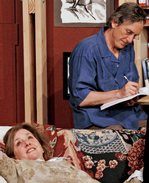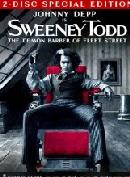HOME PAGE
SITE GUIDE
SEARCH
ADVERTISING AT CURTAINUP
REVIEWS
FEATURES
NEWS
Etcetera and
Short Term Listings
LISTINGS
Broadway
Off-Broadway
NYC Restaurants
BOOKS and CDs
OTHER PLACES
Berkshires
London
California
New Jersey
Philadelphia
Elsewhere
QUOTES
TKTS
PLAYWRIGHTS' ALBUMS
LETTERS TO EDITOR
FILM
LINKS
MISCELLANEOUS
Free Updates
Masthead
Writing for Us
A CurtainUp Los Angeles Review
Come Back, Little Horny
|
You have to leave! You have to love!— Ian to his 30-something live-at-home son Loki<
|

Wendy Phillips and Scott Paulin
(Photo: Anela ) |
Laura Richardson's play premiering at The Lost Theater displays a kind of tough insouciance. Though the excellent cast headed by Paulin and Wendy Philipps and directed with sly astuteness by Martha Demson, give riveting performances and hold the stage despite Horny, the play is somewhat uneven.
Horny is the name Raven (Danielle Weeks) gives to the love-starved dog (Jason Paige) that she brings home to her family in Palo Alto, CA. That's not all she brings home. Raven has written a novel, a thinly disguised roman à clef, in which the family diaries and secrets are hung out for all the world to see.
Dad Ian Maloney, the playwright destroyed by a review entitled Baloney to Maloney, takes to the bottle whenever he can get the key to the liquor cabinet away from wife Susan (Wendy Phillips). His two grown children, Loki (Brendan Bonner), and Nora (Jennifer Erholm) have always lived at home. Loki makes eye glasses and stars in community theatre musicals. Nora is seriously nuts which she blames on an abortion. "Was it my fault? " is Susan's perennial question.
Horny is a walking sight gag, upstaging Ian's poetry reading, and pooping on the living room rug. He's a distraction to the audience as much as the family. He's also the sole love of Raven's life, which seems a little strange since she's only had him one day.
The second act is brightened by the arrival of the glowing Sandra (Briana Mandel), Loki's community theater co-star, who radiates unrequited passion for him. Until the last act no one in the family asks him if he's gay. Their pussy-footing makes him accuse them of making him feel that's a bad thing.
Raven's book unleashes a flood of long-kept secrets and buried feelings. By the end, the parents are talking to their children and each other with new honesty.
Factors contributing to the play's unevenness: the ill-conceived character of Nora. Her abortion jars with the play's comic tone. . . Raven's unaddressed issues . . .the second act's saggy moments.
Wendy Phillips as the matriarch Susan has a musical voice and is such a grounded actress that she lifts the play onto a higher level of reality. Paulin, her real-life as well as stage husband, has a crazed aptitude for physical comedy that expands the play's boundaries. Their three children, though they have no trouble expressing their miseries physically, seem like stunted plants that never got enough sun in the shadow of such outsize parents. Jason Paige's pesky pet has bona fide street creds, down to the anxious expression in his eyes. Production values are excellent, especially Donna Marquet's homey set design and wardrobe consultants Rosemary and Sarah Schaub's contributions.
The play's title is a metaphor for the lack of passion in the family and the yearning for its return. If it does, this playwright will love dealing with it.
|
Come Back, Little Horny Playwright: Laura Richardson Director: Martha Demson Cast: Wendy Phillips (Susan), Scott Paulin (Ian), Jennifer Erholm (Nora), Brendan Bonner (Loki), Danielle Weeks (Raven), Jason Paige (Horny), Briana Mandel (Sandra)_ Set Design: Donna Marquet Wardrobe Consultants: Rosemary and Sarah Schaub Lighting Design: Derrick McDaniel Sound Design: Peter Carlstedt Fight Choreographer: Samuel Hale Production Stage Manager: Sam Grant Running Time: 100 minutes, one intermission Running Dates: May 16-June 20, 2009 Where: The Lost Theatre, 130 S. La Brea, Los Angeles. Reservations: (310) 600-3682 Reviewed by Laura Hitchcock on May 16, 2009. |
|







